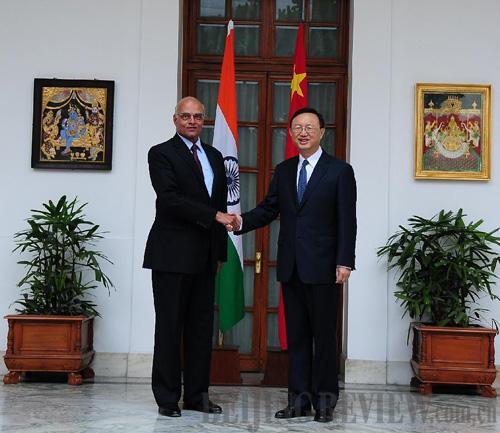|
 |
|
FIRM RESOLVE: Chinese State Councilor Yang Jiechi (right) meets with Indian National Security Adviser Shiv Shankar Menon for border talks in New Delhi on February 10 (CHINESE FOREIGN MINISTRY) |
China and India staged the 17th meeting of special representatives (SRs) for their border dispute on February 10-11. The meeting was generally considered by both sides to be "constructive"—however, some observers claimed the negotiation did not come at the best time and failed to produce a real breakthrough before the meeting as the upcoming Indian general election in the first half year of 2014 could bring political uncertainty to the country.
After the meeting, Indian Ministry of External Affairs spokesperson Syed Akbaruddin remarked to reporters that the meeting took place on the heels of two structured bilateral talks held last year between Indian Prime Minister Manmohan Singh and Chinese Premier Li Keqiang—talks that were hailed as being very constructive.
Positive momentum
Chinese observers claimed that though an immediate breakthrough is unlikely, the SR mechanism is conducive to the stable relationship between the two. The recent meeting could help maintain the momentum of the warming bilateral relations. The negotiation mechanism has also been expanded to be a platform for bilateral cooperation and exchanges, as the entire gamut of bilateral relations was reviewed in the meeting.
The new round of talks was co-chaired by Chinese State Councilor Yang Jiechi and Indian National Security Adviser Shiv Shankar Menon during Yang's latest trip to New Delhi. According to tips disclosed by the Indian Ministry of External Affairs, the two sides discussed additional confidence-building measures such as early implementation of the Border Defense Cooperation Agreement as well as the core issue of a framework agreement for sorting out the border issue. The agreement was signed late last year during Prime Minister Singh's most recent Beijing trip, aimed at enhancing bilateral coordination, expanding on-the-ground engagement and ironing out possibilities of misunderstanding between the armies along the disputed Line of Actual Control.
The two sides agreed that China and India have maintained a positive momentum in their border talks, effectively controlling and managing disputes and differences. Therefore, they have laid advantageous conditions for the healthy, smooth development of bilateral relations. They agreed that before the border issue is resolved, the two sides are willing to let the existing mechanisms concerning the border issue play their full role, and will implement the relevant agreement for maintaining peace.
"Generally speaking, it is not the best time for the China-India border dispute negotiation as India will hold its general election in May," said Lou Chunhao, a researcher on South Asian studies with the China Institutes of Contemporary International Relations. "On the one hand, it is unlikely the Singh administration will take big steps on the border negotiation before the election; on the other hand, some Indian politicians might hype up the border issue for votes around the same time."
The highlight of the two-day SR interaction was an exchange of views on what framework was acceptable for moving over to the third and final phase of settling the border question.
"This is the most difficult stage of the negotiation," Lou said to Beijing Review. He said that during the first phase of the SR talks, the two sides have settled the political parameters and guiding principles for the talks. Now, they need to show their bottom line on the border issue and reach consensus on the basis.
Lou said that although a big breakthrough is still improbable, the SR mechanism has contributed much to the dispute settlement as well as the steadily growing relationship between China and India. "There is no problem for the two countries in crisis management on the border issue," Lou added.
| 